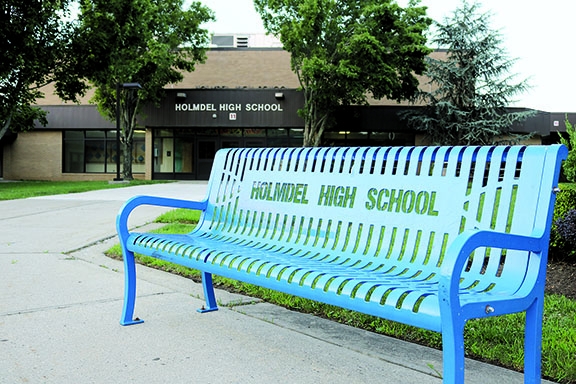
By Stephen Appezzato
Recently, Brookdale Community College professor of political science Jonathan Moschberger tasked his students with attending school board meetings for a firsthand glimpse at the workings of local politics.
Generally, boards of education are one of the lowest tiers of America’s democratic system. School boards govern the policies, personnel and regular business of local public schools. One can expect a usual weeknight meeting to occur in a gymnasium or multipurpose room, where parents and community members who dedicate their time to serving on the board discuss paid leave for teachers, budgeting and facility improvements and other mundane topics.
However, when his students reported on the meetings they attended, Moschberger learned they had been stunned to witness Machiavellian antics that unfolded in the most unexpected settings.
“They were really shocked to see some of the contention and I’d say how certain behaviors digressed amongst the board of education members,” Moschberger said.
The inside glimpse at small-town politics was “revealing to students,” he said, but also “very disappointing to see that kind of behavior on display at a public meeting.”
In recent years, school boards have become a kind of theater for arguing, infighting, political moves and vitriol.
What caused this unusual nationwide trend? According to Moschberger, partisanship.
“These boards have become more partisan, as opposed to the norm. They’re supposed to be more nonpartisan bodies,” he said.
In New Jersey, school board elections are technically defined as nonpartisan, where a candidate does not run under a political party and the designation Republican or Democrat does not appear under their name on the ballot.
“Now, granted, some of these candidates are Republicans and they are Democrats. But that party label can’t appear on the ballot,” Moschberger said.
To skirt the issue, candidates often run with platform slogans, which are typically the names of their campaigns, and “sometimes those are revealing,” he said.
“What we’re seeing is slates of candidates that are either more to the left or more to the right run for boards of education, and this has been a trend only in recent years – I would say largely during the Trump era where we’ve seen this come to light,” Moschberger explained.
Before that, “they were more objective bodies and they were more nonpartisan in nature, which is what they should be.”
The intertwining of local politics and school board races showed during the recent election cycle.
In Holmdel, school board candidates Alison LoPresti, Anthony Libecci and Reham Taha, who ran together, were publicly endorsed by the Holmdel Republican Committee. The slate ran with a Parental Rights & Education slogan, a common theme across more right-leaning slates locally. LoPresti and Libecci won seats, while Taha barely lost to board president Peter Reddy who won another term. Holmdel Democrats, on its Facebook page, promoted candidates unaffiliated with the Parental Rights & Education slate: Peter Reddy and write-ins Alicia Unusan and Mat Weisfeld.
In a heated race in Colts Neck, candidates under the Colts Kids First banner celebrated a sweeping win after members Jason Orrico, Kevin Walsh and Vincent Rugnetta won full terms, and Angelique Volpe won a two-year term. The self-described “conservative slate” displayed its endorsement from Republican political pundit Bill Spadea and promoted Monmouth County Republican Committee messages across social media. The losing slate, The Leaders Our Children Deserve, ran with a nonpartisan message, pledging to abide by the New Jersey School Boards Association’s Code of Ethics – where board members have an ethical obligation to abandon partisan leanings and affiliations with special interest groups.
In Middletown, board incumbents Frank Capone, Jacqueline Tobacco and newcomer Caterina Skalaski boasted a similar sweeping win when their Putting Children First (PCF) slate won all three seats up for grabs.
In the summer, Capone and Tobacco caught the media’s eye when the district was sued by the state Attorney General for rescinding its “student-centered” transgender student policy. Many conservatives stood behind the two in the David versus Goliath-like politically-charged court case that ensued – and which remains unresolved.
While PCF is technically not affiliated with a political party, some assert it is a clear extension of the Middletown Republican Committee. Republican Mayor Tony Perry publicly supported the PCF slate at its fundraiser.
Similarly, the slate received campaign donations from local Republican officials and groups, including Perry, Friends of Tom Arnone, O’Scanlon for Senate, Scharfenberger for Assembly, Assemblywoman Vicky Flynn and county Commissioner Ross Licitra.
The school board race in Middletown heated up when independent candidate Mark Soporowski accused township officials on Facebook of “bullying, harassment, and alleged corruption.” According to Soporowski, former mayor and Republican Committee assistant Tony Fiore alluded in a Facebook comment that a surprise visit from a fire inspector would occur at a recent campaign event hosted at his business. At the event, a fire inspector did attend to check occupancy. “It seems taxpayers’ money was expended for the inspector to be present outside my store for mere political purposes,” Soporowski said.
Fiore, Perry and other officials denied any political wrongdoing, asserting it was routine, as fire inspectors often turn up at publicly advertised events.
This article originally appeared in the November 16 – 22, 2023 print edition of The Two River Times.














